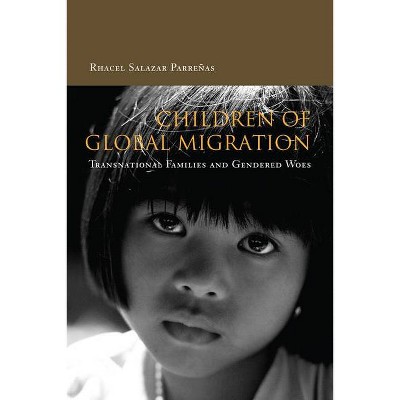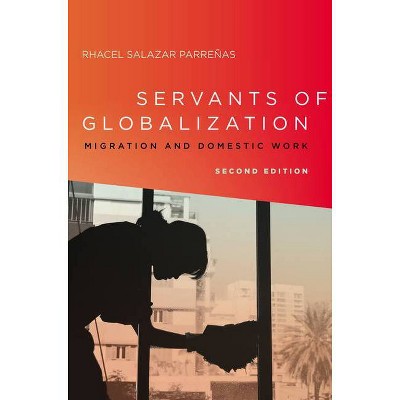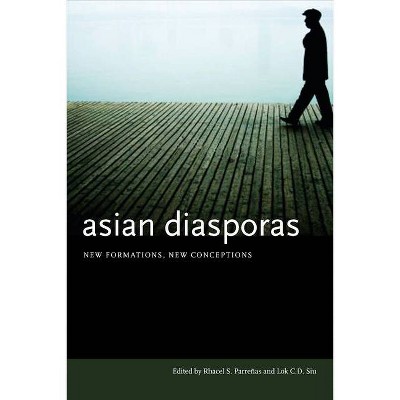Children of Global Migration - by Rhacel Parreñas (Paperback)

Similar Products
Products of same category from the store
AllProduct info
<p/><br></br><p><b> About the Book </b></p></br></br>With an ethnographer's ear and a social critic's lens, Rhacel Salazar Parreñas illuminates the care deficit of the immigrant second generation, the children of transnational Filipino families left behind by mothers and fathers who labor in the global economy.--Eileen Boris, University of California, Santa Barbara<p/><br></br><p><b> Book Synopsis </b></p></br></br>"With an ethnographer's ear and a social critic's lens, Rhacel Salazar Parreñas illuminates the care deficit of the immigrant second generation, the children of transnational Filipino families left behind by mothers and fathers who labor in the global economy."-Eileen Boris, University of California, Santa Barbara<p/><br></br><p><b> From the Back Cover </b></p></br></br>"In her earlier important work, Servants of Globalization, Rhacel Parrenas described the extraordinary migration of Filipinas to care jobs in the North. In this book she turns to the children left behind. Through superb interviewing, Parrenas uncovers the poignant story of absent mothers, present but unaccommodating fathers, kin helpers, and children haunted by the feeling of being left behind. These children are, Parrenas shows us, the 'fall guys' of a powerful global logic far beyond their control. This is a brilliant book we all should read."--Arlie Hochschild, co-editor with Barbara Ehrenreich of Global Woman: Nannies, Maids and Sex Workers in the New Economy and The Commercialization of Intimate Life<br>"With an ethnographer's ear and a social critic's lens, Rhacel Salazar<br>Parrenas illuminates the care deficit of the immigrant second generation, the children of transnational Filipino families left behind by mothers and<br>fathers who labor in the global economy. Her uncovering of the gender paradox--the intensification of the gender division of labor, of male providers and female nurturers, despite women's wage work--is nothing less than brilliant!"--Eileen Boris, Hull Professor of Women's Studies, University of California, Santa Barbara<p/><br></br><p><b> Review Quotes </b></p></br></br><br><i>Children of Global Migration</i> is accessibly written and clearly argued, lending itself to a useful classroom text in undergraduate courses on family, gender, immigration, childhood, and/or ethnography. It is yet another significant work in Parreñas's growing corpus of transnational scholarship.--<i>Canadian Journal of Sociology Online</i><br><br>A fascinating study on the implications for families of large-scale temporary worker migration.--<i>CHOICE</i><br><br>In her earlier important work, <i>Servants of Globalization</i>, Rhacel Parreñas described the extraordinary migration of Filipinas to care jobs in the North. In this book she turns to the children left behind. Through superb interviewing, Parreñas uncovers the poignant story of absent mothers, present but unaccommodating fathers, kin helpers, and children haunted by the feeling of being left behind. These children are, Parrenas shows us, the 'fall guys' of a powerful global logic far beyond their control. This is a brilliant book we all should read.--Arlie Hochschild "co-editor with Barbara Ehrenreich of <i>Global Woman: Nannies, Maids and Sex Workers in the New Economy</i> and <i>The Commercialization of Intimate Life</i>"<br><br>Rhacel Parreñas provides a much needed perspective on the lives of the families of overseas contract workers. Her interviews provide us with a suggestive look into the changing dynamics of gender roles and to the reformulation of patriarchal ideology among Filipino families broken up by the demands of globalization. This is a highly instructive and eminently useful work for considering the relations between the gendering of globallabor and the conservative reconstitution of gender norms in the nation-state.--Vicente L. Rafael "University of Washington"<br><br>This book greatly contributes to our understanding of the transnational family. It will raise general awareness about the all too frequently overlooked second generation in the policy regulation of immigration.--Pei-Chia Lan "National Taiwan University"<br><br>This book makes a novel and significant contribution by addressing the children left behind in labor migration. Parreñas provides a vivid account of the severe family dislocation experienced within transnational Filipino families, and elaborates a disturbing analysis of the linkages between the discipline of the IMF, the privatization of state services in the Philippines, and transnational coping strategies of middle class Filipino families. She raises profound ethical issues about the transfer of care work from global south to global north.--Geraldine Pratt "University of British Columbia"<br><br>With an ethnographer's ear and a social critic's lens, Rhacel SalazarParreñas illuminates the care deficit of the immigrant second generation, the children of transnational Filipino families left behind by mothers andfathers who labor in the global economy. Her uncovering of the gender paradox--the intensification of the gender division of labor, of male providers and female nurturers, despite women's wage work--is nothing less than brilliant!--Eileen Boris, Hull Professor of Women's Studies "University of California, Santa Barbara"<br><p/><br></br><p><b> About the Author </b></p></br></br>Rhacel Salazar Parreñas is Professor of Asian American Studies at the University of California, Davis. She is the author of <i>Servants of Globalization: Women, Migration, and Domestic Work</i> (Stanford, 2001).
Price History
Price Archive shows prices from various stores, lets you see history and find the cheapest. There is no actual sale on the website. For all support, inquiry and suggestion messagescommunication@pricearchive.us


















